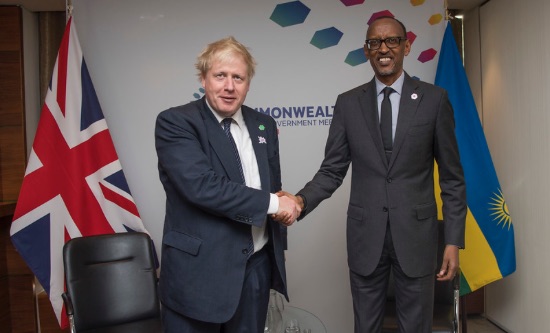
Britain’s decision to use Rwanda in east Africa as a dumping ground for unwanted asylum seekers refocuses attention on Rwanda’s role as an outpost of British imperialism. Rwanda is a tiny landlocked state with virtually no resources; 60% of the population lives in abject poverty and 70% survives by subsistence farming. Yet the country is a major exporter of critical minerals for the electronics industry. Rwanda hosts a major military base at Musanze where British and US military forces train African armies. It is the third largest troop contributor to UN ‘peacekeeping’ missions, with troops in west Sudan (Darfur), South Sudan, Mozambique, Central African Republic (CAR) and the Democratic Republic of Congo (DRC). CHARLES CHINWEIZU reports on the role of Rwanda as a tool of imperialism.
Rwandan genocide
Belgian imperialists were obsessed with racist pseudoscience and decided that Tutsis were superior to Hutus based on facial traits and aristocratic history. Although Tutsis made up only ~9% of the population, they were favoured by German and then by Belgian colonialism and used as colonial administrators. The local religion which had been a unifying force was replaced by Catholicism. Tutsis became responsible for assigning oppressive forced labour and punishments, inspiring growing hatred among the Hutus.1 Only Tutsi children were allowed to attend school, and identity cards recording ‘ethnicity’ were introduced.
Previously fluid and quasi-ethnic groups were subjected to divide-and-rule tactics and strict hierarchical structures, which fostered ethnic antagonisms in Rwanda, as in neighbouring Burundi. Fears of a ‘Hutu uprising’ in Burundi triggered a genocide of possibly 300,000 Hutus in 1972 by the Tutsi regime there; and there were subsequent pogroms in 1993, predominantly of Tutsis.
On the eve of Rwandan independence in 1962, with the Tutsi elite supporting the growing African independence movement, Belgium began supporting the Hutu ‘revolution’ against Tutsi ‘invaders’, leading to the first genocide and exodus of Tutsis to Zaire, Tanzania, Burundi and mostly to Uganda. Belgium has a lot of blood on its hands.
The Rwandan civil war began in 1990 when the Rwandan Patriotic Army (RPA) militia invaded from Uganda. The RPA and its political wing the Rwandan Patriotic Front (RPF), led by current President Paul Kagame, were composed of Tutsi refugees who had fled to Uganda to escape the pogroms by the Hutu Rwandan government following ‘independence’.
In April 1994, then Hutu President Juvenal Habyarimana died when his plane was shot down by the RPF. This triggered a well-planned genocide by the Hutu Rwandan government in which a million people were killed in 100 days. The RPF then took over Rwanda in July 1994 and carried out its own massacres
France v Britain
The east African region has been dominated by British imperialism since 1882. Rwanda represented for French imperialism a foothold in a largely British-dominated region. Rwanda was one of a few countries where the French language was already dominant. In 1963, a French official claimed Rwanda could ‘contribute effectively to the development of French influence’ and serve as ‘a significant instrument of cultural penetration…’ A Franco-Rwandan military cooperation agreement was signed in 1975.
After the 1990 RPF invasion, France flew in 600 troops to support the Hutu government. After Habyarimana was killed in 1994, 10 members of his family were flown out aboard French aircraft. France trained the Interahamwe militia that carried out the genocide and, under cover of a humanitarian rescue mission, enabled the perpetrators to flee the country.
While France backed the Hutu government, Britain had supported the Kagame-led RPF since its formation in 1986. Kagame was Uganda’s head of military intelligence, and his militia helped current president Museveni come to power in 1986. Kagame and the RPA were trained by US and British forces. The 1990 RPF invasion had the approval and active assistance of the CIA and MI6.
When the 1994 crisis began, Britain portrayed the RPF as the ‘government in waiting’ who should be left to ‘take care of the current disorder’.2 The US and Britain blocked the use of the word ‘genocide’ or any timely action at the UN Security Council in order to allow the RPF to complete its takeover. Genocide was the price the Rwandan masses paid for Britain and the US ousting France from the region. Rwanda subsequently joined the British Commonwealth in 2009 and declared English its official language, to better align itself culturally and economically with the other British neo-colonies in the region.
Genocide in Congo
Between 1996 and 2004 Rwanda invaded DRC (Zaire) at least four times. An estimated 6.4 million people have died as a result of the wars waged in DRC by Rwanda, Uganda and Burundi. The impunity of Rwanda fuels the cycle of violence in DRC. Using the pretence of hunting war criminals who fled to eastern DRC in 1994, Rwanda continues to plunder DRC’s natural resources. Hence despite having negligible reserves itself, Rwanda became a major source of critical raw materials such as gold, diamonds and coltan. In 2020, Rwanda was the second top exporter of niobium/tantalum (coltan) and vanadium ores critical in the manufacture of electronic components for computers, airplanes, automobiles and steel (vanadium). Rwanda permanently occupies eastern DRC and is a conduit for the US and British to continue looting DRC.
The imperialists use Rwanda to defend their economic interests in Africa. When French-backed ‘rebels’ in CAR were close to seizing the capital Bangui in January 2021, Rwanda ‘got the call’ and, along with Russia, intervened to save President Touadera. Energy giants Exxon, BP and Total have invested up to $128bn in gas projects in Mozambique; in March 2021, when jihadi rebels seized the Mozambican town of Palma, Rwanda was again called in to restore ‘stability’.
1. Colette Braeckman ‘Belgium’s role in Rwandan genocide’, Le Monde Diplomatique, June 2021.
2. Hazel Cameron, ‘British state complicity in genocide: Rwanda 1994’, State Crime Journal, 2012.
Fight Racism! Fight Imperialism! no 288, June/July 2022




